Piano Sheet Music
 "The great British blues guitarists of the Sixties - people like Eric Clapton, Jeff Beck, Jimmy Page and Peter Green - could play like virtuosos, but they also understood the importance of energy and intensity" Joe Perry / Aerosmith
"The great British blues guitarists of the Sixties - people like Eric Clapton, Jeff Beck, Jimmy Page and Peter Green - could play like virtuosos, but they also understood the importance of energy and intensity" Joe Perry / Aerosmith
Ludwig van Beethoven

Ludwig van Beethoven (/ˈlʊdvɪɡ væn ˈbeɪt(h)oʊvən/ (About this soundlisten); German: (About this soundlisten); baptised 17 December 1770 – 26 March 1827) was a German composer and pianist. A crucial figure in the transition between the classical and romantic eras in classical music, he remains one of the most recognized and influential musicians of this period, and is considered to be one of the greatest composers of all time.
Beethoven was born in Bonn, the capital of the Electorate of Cologne, and part of the Holy Roman Empire. He displayed his musical talents at an early age and was vigorously taught by his father Johann van Beethoven, and was later taught by composer and conductor Christian Gottlob Neefe. At age 21, he moved to Vienna and studied composition with Joseph Haydn. Beethoven then gained a reputation as a virtuoso pianist, and was soon courted by Prince Lichnowsky for compositions, which resulted in Opus 1 in 1795.
Beethoven was born in Bonn, the capital of the Electorate of Cologne, and part of the Holy Roman Empire. He displayed his musical talents at an early age and was vigorously taught by his father Johann van Beethoven, and was later taught by composer and conductor Christian Gottlob Neefe. At age 21, he moved to Vienna and studied composition with Joseph Haydn. Beethoven then gained a reputation as a virtuoso pianist, and was soon courted by Prince Lichnowsky for compositions, which resulted in Opus 1 in 1795.
Lineu Soares

Lineu Soares in Piano from the São Judas Tadeu University (1988) and master in Music from the State University of Campinas (2012). He is currently a University Professor at the Adventist University Center of São Paulo.
Evanescence

Evanescence is an American rock band founded in Little Rock, Arkansas in 1995 by singer/pianist Amy Lee and guitarist Ben Moody.
After recording two private EPs and a demo CD named Origin, with the help of Bigwig Enterprises in 2000, the band released their first full-length album, Fallen, on Wind-up Records in 2003. Fallen sold more than 15 million copies worldwide and helped the band win two Grammy Awards. A year later, Evanescence released their first live album, Anywhere but Home, which sold more than one million copies worldwide. In 2006, the band released their second studio album, The Open Door, which has sold more than four million copies.
The band has suffered several line-up changes, including co-founder Moody leaving in 2003, followed by guitarist John LeCompt and drummer Rocky Gray in 2007. Lee is now the only original member of Evanescence remaining in the band.
After recording two private EPs and a demo CD named Origin, with the help of Bigwig Enterprises in 2000, the band released their first full-length album, Fallen, on Wind-up Records in 2003. Fallen sold more than 15 million copies worldwide and helped the band win two Grammy Awards. A year later, Evanescence released their first live album, Anywhere but Home, which sold more than one million copies worldwide. In 2006, the band released their second studio album, The Open Door, which has sold more than four million copies.
The band has suffered several line-up changes, including co-founder Moody leaving in 2003, followed by guitarist John LeCompt and drummer Rocky Gray in 2007. Lee is now the only original member of Evanescence remaining in the band.
U2

U2 are a rock band from Dublin, Ireland. The band consists of Bono (vocals and guitar), The Edge (guitar, keyboards, and vocals), Adam Clayton (bass guitar) and Larry Mullen, Jr. (drums and percussion).
The band formed in 1976 when the members were teenagers with limited musical proficiency. By the mid-1980s, however, the band had become a top international act, noted for their anthemic sound, Bono's impassioned vocals, and The Edge's textural guitar playing. Their success as a live act was greater than their success at selling records until their 1987 album The Joshua Tree increased the band's stature "from heroes to superstars," according to Rolling Stone. U2 responded to the dance and alternative rock revolutions, and their own sense of musical stagnation by reinventing themselves with their 1991 album Achtung Baby and the accompanying Zoo TV Tour. Similar experimentation continued for the rest of the 1990s. Since 2000, U2 have pursued a more traditional sound that retains the influence of their previous musical explorations.
U2 have sold more than 140 million albums worldwide and have won 22 Grammy Awards, more than any other band. In 2005, the band were inducted into the Rock and Roll Hall of Fame in their first year of eligibility. Rolling Stone magazine listed U2 at #22 in its list of the 100 greatest artists of all time. Throughout their career, as a band and as individuals, they have campaigned for human rights and social justice causes, including Amnesty International, the ONE Campaign, and Bono's DATA (Debt, AIDS, Trade in Africa) campaign.
The band formed in 1976 when the members were teenagers with limited musical proficiency. By the mid-1980s, however, the band had become a top international act, noted for their anthemic sound, Bono's impassioned vocals, and The Edge's textural guitar playing. Their success as a live act was greater than their success at selling records until their 1987 album The Joshua Tree increased the band's stature "from heroes to superstars," according to Rolling Stone. U2 responded to the dance and alternative rock revolutions, and their own sense of musical stagnation by reinventing themselves with their 1991 album Achtung Baby and the accompanying Zoo TV Tour. Similar experimentation continued for the rest of the 1990s. Since 2000, U2 have pursued a more traditional sound that retains the influence of their previous musical explorations.
U2 have sold more than 140 million albums worldwide and have won 22 Grammy Awards, more than any other band. In 2005, the band were inducted into the Rock and Roll Hall of Fame in their first year of eligibility. Rolling Stone magazine listed U2 at #22 in its list of the 100 greatest artists of all time. Throughout their career, as a band and as individuals, they have campaigned for human rights and social justice causes, including Amnesty International, the ONE Campaign, and Bono's DATA (Debt, AIDS, Trade in Africa) campaign.
Rossini

Gioachino Antonio Rossini (February 29, 1792 – November 13, 1868) was a popular Italian composer who created 39 operas as well as sacred music and chamber music. His best known works include Il barbiere di Siviglia (The Barber of Seville), La Cenerentola and Guillaume Tell (William Tell).
Rossini's most famous opera was produced on February 20, 1816 at the Teatro Argentina in Rome. The libretto by Cesare Sterbini, a version of Pierre Beaumarchais' infamous stage play Le Barbier de Séville, was the same as that already used by Giovanni Paisiello in his own Barbiere, an opera which had enjoyed European popularity for more than a quarter of a century. Much is made of how fast Rossini's opera was written, scholarship generally agreeing upon two weeks. Later in life, Rossini claimed to have written the opera in only twelve days. It was a colossal failure when it premiered as Almaviva; Paisiello’s admirers were extremely indignant, sabotaging the production by whistling and shouting during the entire first act. However, not long after the second performance, the opera became so successful that the fame of Paisiello's opera was transferred to Rossini's, to which the title The Barber of Seville passed as an inalienable heritage.
Rossini's most famous opera was produced on February 20, 1816 at the Teatro Argentina in Rome. The libretto by Cesare Sterbini, a version of Pierre Beaumarchais' infamous stage play Le Barbier de Séville, was the same as that already used by Giovanni Paisiello in his own Barbiere, an opera which had enjoyed European popularity for more than a quarter of a century. Much is made of how fast Rossini's opera was written, scholarship generally agreeing upon two weeks. Later in life, Rossini claimed to have written the opera in only twelve days. It was a colossal failure when it premiered as Almaviva; Paisiello’s admirers were extremely indignant, sabotaging the production by whistling and shouting during the entire first act. However, not long after the second performance, the opera became so successful that the fame of Paisiello's opera was transferred to Rossini's, to which the title The Barber of Seville passed as an inalienable heritage.
Georges Bizet

Georges Bizet (25 October 1838 – 3 June 1875) was a French composer and pianist of the Romantic era. He is best known for the opera Carmen.
Bizet was born at 26 rue de la Tour d'Auvergne in the 9th arrondissement of Paris in 1838. He was registered with the legal name Alexandre César Léopold Bizet, but he was baptised on 16 March 1840 with the first name Georges, and he was always known thereafter as Georges Bizet. His father Adolphe Armand Bizet (1810-86) was an amateur singer and composer, and his mother, Aimée Léopoldine Joséphine née Delsarte (1814-61), was the sister of the famous singing teacher François Delsarte.
He entered the Paris Conservatory of Music on 9 October 1848, a fortnight before his tenth birthday. His teachers there were Pierre Zimmermann (fugue and counterpoint; often assisted by his son-in-law Charles Gounod), Antoine François Marmontel (piano), François Benoist (organ) and, on Zimmermann's death, Fromental Halévy, whose daughter he himself later married. He won first prizes for organ and fugue in 1855 and completed his earliest compositions.
His first symphony, the Symphony in C, was written in November 1855, when he was seventeen, evidently as a student assignment. It was unknown to the world until 1933, when it was discovered in the archives of the Paris Conservatory library. Upon its first performance in 1935, it was immediately hailed as a junior masterwork and a welcome addition to the early Romantic period repertoire. The symphony bears a stylistic resemblance to the first symphony of Gounod, first played earlier in the same year, and which Bizet had arranged for two pianos although present-day listeners may discern a similarity to music of Franz Schubert, whose work was little known in France at the time the symphony was written.
In 1857, a setting of the one-act operetta Le docteur Miracle won him a share in a prize offered by Jacques Offenbach. He also won the music composition scholarship of the Prix de Rome, the conditions of which required him to study in Rome for three years. There, his talent developed as he wrote such works as the opera buffa Don Procopio (1858-59). There he also composed his only major sacred work, Te Deum (1858), which he submitted to the Prix Rodrigues competition, a contest for Prix de Rome winners only. Bizet failed to win the Prix Rodrigues, and the Te Deum score remained unpublished until 1971. He made two attempts to write another symphony in 1859, but destroyed the manuscripts in December of that year. Apart from this period in Rome, Bizet lived in the Paris area all his life.
Shortly after leaving Rome in July 1860, but while still touring in Italy, he had the idea of writing a symphony in which each of the four movements would be a musical evocation of a different Italian city – Rome, Venice, Florence and Naples. On hearing of his mother's serious illness he cut short his Italian travels and returned to Paris in September 1860; she died a year later. The Scherzo of the symphony was completed by November 1861, but it was not until 1866 that the first version of the whole symphony was written. He subjected it to a number of revisions through to 1871, but died before ever producing what he considered the definitive version. For this reason, the work is sometimes described as "unfinished", but this is an inaccurate description as it was fully scored. It was published in 1880 as the Roma Symphony.
Bizet was born at 26 rue de la Tour d'Auvergne in the 9th arrondissement of Paris in 1838. He was registered with the legal name Alexandre César Léopold Bizet, but he was baptised on 16 March 1840 with the first name Georges, and he was always known thereafter as Georges Bizet. His father Adolphe Armand Bizet (1810-86) was an amateur singer and composer, and his mother, Aimée Léopoldine Joséphine née Delsarte (1814-61), was the sister of the famous singing teacher François Delsarte.
He entered the Paris Conservatory of Music on 9 October 1848, a fortnight before his tenth birthday. His teachers there were Pierre Zimmermann (fugue and counterpoint; often assisted by his son-in-law Charles Gounod), Antoine François Marmontel (piano), François Benoist (organ) and, on Zimmermann's death, Fromental Halévy, whose daughter he himself later married. He won first prizes for organ and fugue in 1855 and completed his earliest compositions.
His first symphony, the Symphony in C, was written in November 1855, when he was seventeen, evidently as a student assignment. It was unknown to the world until 1933, when it was discovered in the archives of the Paris Conservatory library. Upon its first performance in 1935, it was immediately hailed as a junior masterwork and a welcome addition to the early Romantic period repertoire. The symphony bears a stylistic resemblance to the first symphony of Gounod, first played earlier in the same year, and which Bizet had arranged for two pianos although present-day listeners may discern a similarity to music of Franz Schubert, whose work was little known in France at the time the symphony was written.
In 1857, a setting of the one-act operetta Le docteur Miracle won him a share in a prize offered by Jacques Offenbach. He also won the music composition scholarship of the Prix de Rome, the conditions of which required him to study in Rome for three years. There, his talent developed as he wrote such works as the opera buffa Don Procopio (1858-59). There he also composed his only major sacred work, Te Deum (1858), which he submitted to the Prix Rodrigues competition, a contest for Prix de Rome winners only. Bizet failed to win the Prix Rodrigues, and the Te Deum score remained unpublished until 1971. He made two attempts to write another symphony in 1859, but destroyed the manuscripts in December of that year. Apart from this period in Rome, Bizet lived in the Paris area all his life.
Shortly after leaving Rome in July 1860, but while still touring in Italy, he had the idea of writing a symphony in which each of the four movements would be a musical evocation of a different Italian city – Rome, Venice, Florence and Naples. On hearing of his mother's serious illness he cut short his Italian travels and returned to Paris in September 1860; she died a year later. The Scherzo of the symphony was completed by November 1861, but it was not until 1866 that the first version of the whole symphony was written. He subjected it to a number of revisions through to 1871, but died before ever producing what he considered the definitive version. For this reason, the work is sometimes described as "unfinished", but this is an inaccurate description as it was fully scored. It was published in 1880 as the Roma Symphony.
George Gershwin

George Gershwin (September 26, 1898 – July 11, 1937) was an American composer. He wrote most of his vocal and theatrical works in collaboration with his elder brother, lyricist Ira Gershwin. George Gershwin composed songs both for Broadway and for the classical concert hall. He also wrote popular songs with success.
Many of his compositions have been used on television and in numerous films, and many became jazz standards. The jazz singer Ella Fitzgerald recorded many of the Gershwins' songs on her 1959 Gershwin Songbook (arranged by Nelson Riddle). Countless singers and musicians have recorded Gershwin songs, including Fred Astaire, Louis Armstrong, Al Jolson, Bobby Darin, Art Tatum, Bing Crosby, Janis Joplin, John Coltrane, Frank Sinatra, Billie Holiday, Sam Cooke, Miles Davis, Herbie Hancock, Madonna, Judy Garland, Julie Andrews, Barbra Streisand, Marni Nixon, Natalie Cole, Patti Austin, Nina Simone, Maureen McGovern, John Fahey, The Residents, Than & Sam, Sublime, and Sting. A residential building is named after him on the Stony Brook University campus.
Many of his compositions have been used on television and in numerous films, and many became jazz standards. The jazz singer Ella Fitzgerald recorded many of the Gershwins' songs on her 1959 Gershwin Songbook (arranged by Nelson Riddle). Countless singers and musicians have recorded Gershwin songs, including Fred Astaire, Louis Armstrong, Al Jolson, Bobby Darin, Art Tatum, Bing Crosby, Janis Joplin, John Coltrane, Frank Sinatra, Billie Holiday, Sam Cooke, Miles Davis, Herbie Hancock, Madonna, Judy Garland, Julie Andrews, Barbra Streisand, Marni Nixon, Natalie Cole, Patti Austin, Nina Simone, Maureen McGovern, John Fahey, The Residents, Than & Sam, Sublime, and Sting. A residential building is named after him on the Stony Brook University campus.
Reborn!

Reborn!, known in Japan as Katekyō Hitman Reborn!, is a Japanese manga series written and illustrated by Akira Amano. It follows Tsunayoshi Sawada, a young boy who discovers that he is next in line to become boss of the Vongola family, a powerful Mafia organization.
Traditional

Wicked

Wicked is a musical with songs and lyrics by Stephen Schwartz and a book by Winnie Holzman. The story is based on the best-selling novel Wicked: The Life and Times of the Wicked Witch of the West by Gregory Maguire, a parallel novel of L. Frank Baum's classic story The Wonderful Wizard of Oz from the perspective of the witches of the Land of Oz.
Wicked tells the story of Elphaba, the future Wicked Witch of the West and her relationship with Glinda, the Good Witch of the North. Their friendship struggles through their opposing personalities and viewpoints, rivalry over the same love-interest, their reactions to the Wizard's corrupt government, and, ultimately, Elphaba's public fall from grace. The plot is set mostly before Dorothy's arrival from Kansas, and includes several references to well-known scenes and dialogue in the 1939 film The Wizard of Oz.
The musical debuted on Broadway on October 30, 2003. It is produced by Universal Pictures and directed by Joe Mantello, with musical staging by Wayne Cilento. Its original stars were Idina Menzel as Elphaba, Kristin Chenoweth as Glinda, and Joel Grey as the Wizard. Although the production received mixed reviews and was panned by The New York Times, it has proved to be a favorite among patrons. The Broadway production's success spawned productions in Chicago, Los Angeles, London's West End, Tokyo, Melbourne, and Stuttgart, along with two North American tours that have visited over 30 cities in Canada and the United States.
The score of Wicked is heavily thematic, bearing in some senses more resemblance to a film score than a musical's score. While many musicals' scores develop new motifs and melodies for each song with little overlap, Schwartz integrated a handful of leitmotifs throughout the production. A cast recording of the original Broadway production was released on December 16, 2003, by Universal Music. All of the songs featured on stage are present on the recording with the exception of "The Wizard And I (Reprise)" and "The Wicked Witch of the East". The short reprise of "No One Mourns The Wicked" that opens Act II is attached to the beginning of "Thank Goodness". The music was arranged by Stephen Oremus, who was also the conductor and director, and James Lynn Abbott, with orchestrations by William David Brohn. The recording received the Grammy Award for Best Musical Show Album in 2005 and was certified platinum by the RIAA on November 30, 2006.
Wicked tells the story of Elphaba, the future Wicked Witch of the West and her relationship with Glinda, the Good Witch of the North. Their friendship struggles through their opposing personalities and viewpoints, rivalry over the same love-interest, their reactions to the Wizard's corrupt government, and, ultimately, Elphaba's public fall from grace. The plot is set mostly before Dorothy's arrival from Kansas, and includes several references to well-known scenes and dialogue in the 1939 film The Wizard of Oz.
The musical debuted on Broadway on October 30, 2003. It is produced by Universal Pictures and directed by Joe Mantello, with musical staging by Wayne Cilento. Its original stars were Idina Menzel as Elphaba, Kristin Chenoweth as Glinda, and Joel Grey as the Wizard. Although the production received mixed reviews and was panned by The New York Times, it has proved to be a favorite among patrons. The Broadway production's success spawned productions in Chicago, Los Angeles, London's West End, Tokyo, Melbourne, and Stuttgart, along with two North American tours that have visited over 30 cities in Canada and the United States.
The score of Wicked is heavily thematic, bearing in some senses more resemblance to a film score than a musical's score. While many musicals' scores develop new motifs and melodies for each song with little overlap, Schwartz integrated a handful of leitmotifs throughout the production. A cast recording of the original Broadway production was released on December 16, 2003, by Universal Music. All of the songs featured on stage are present on the recording with the exception of "The Wizard And I (Reprise)" and "The Wicked Witch of the East". The short reprise of "No One Mourns The Wicked" that opens Act II is attached to the beginning of "Thank Goodness". The music was arranged by Stephen Oremus, who was also the conductor and director, and James Lynn Abbott, with orchestrations by William David Brohn. The recording received the Grammy Award for Best Musical Show Album in 2005 and was certified platinum by the RIAA on November 30, 2006.
Christina Perri

Christina Perri (born August 19, 1986) is an American singer and songwriter from Philadelphia. Her song "Jar of Hearts" charted in the United States after it was featured on the Fox television show So You Think You Can Dance in 2010. Rolling Stone named her the "Band of the Week" on October 26, 2010. On May 10, 2011, Perri's "Jar of Hearts" was featured on Glee (Season 2, Episode 20 "Prom Queen").
Nightnoise
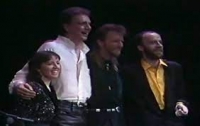
Nightnoise was a music ensemble active from 1984 to 1997. Their original blend of Irish traditional music, Celtic music, jazz, and classical chamber music inspired a generation of Irish musicians. They released seven albums on the Windham Hill label.
Leonard Bernstein

Leonard Bernstein (pronounced /ˈbɜrn.staɪn/, us dict: bûrn′·stīn; August 25, 1918 – October 14, 1990) was an American conductor, composer, author, music lecturer and pianist. He was among the first conductors born and educated in the United States of America to receive worldwide acclaim. He was probably best known to the public as the longtime music director of the New York Philharmonic, for conducting concerts by many of the world's leading orchestras, and for writing the music for West Side Story, Candide, Wonderful Town, and On the Town. Bernstein was the first classical music conductor to make numerous television appearances, perhaps more than any other classical conductor, all between 1954 and 1989. He had a formidable piano technique and as a composer wrote many types of music from Broadway shows to symphonies. According to the New York Times, he was "one of the most prodigally talented and successful musicians in American history."
Boys Will Be Boys

Boys Will Be Boys refers to multiple artists: 1) Powerpop band from Fairfax, VA 2) House supergroup made up of Tiësto, Angger Dimas and Showtek. 3) Indie rock/lo-fi band from Latvia 1) Boys Will Be Boys, those 4 simple word could easily sum up the band, Lehi (Vox/bass), Mark Wood (Drums/ pr…
Sperion

Sperion Musician/band. Anime / Game / J-Drama / Japanese popular music and soundtrack transcriber / arranger.
John Williams

John Towner Williams (born February 8, 1932) is an American composer, conductor, and pianist. In a career that spans six decades, Williams has composed many of the most famous film scores in Hollywood history, including Star Wars, Superman, Home Alone, the first three Harry Potter movies and all but two of Steven Spielberg's feature films including the Indiana Jones series, Schindler's List, E.T. the Extra-Terrestrial, Jurassic Park and Jaws. He also composed the soundtrack for the hit 1960s television series Lost in Space as well as the fanfare of the DreamWorks Pictures' logo.
Williams has composed theme music for four Olympic Games, the NBC Nightly News, the rededication of the Statue of Liberty, and numerous television series and concert pieces. He served as the principal conductor of the Boston Pops Orchestra from 1980 to 1993, and is now the orchestra's laureate conductor.
Williams is a five-time winner of the Academy Award. He has also won four Golden Globe Awards, seven BAFTA Awards and 21 Grammy Awards. With 45 Academy Award nominations, Williams is, together with composer Alfred Newman, the second most nominated person after Walt Disney. He was inducted into the Hollywood Bowl Hall of Fame in 2000, and was a recipient of the Kennedy Center Honors in 2004.
Williams has composed theme music for four Olympic Games, the NBC Nightly News, the rededication of the Statue of Liberty, and numerous television series and concert pieces. He served as the principal conductor of the Boston Pops Orchestra from 1980 to 1993, and is now the orchestra's laureate conductor.
Williams is a five-time winner of the Academy Award. He has also won four Golden Globe Awards, seven BAFTA Awards and 21 Grammy Awards. With 45 Academy Award nominations, Williams is, together with composer Alfred Newman, the second most nominated person after Walt Disney. He was inducted into the Hollywood Bowl Hall of Fame in 2000, and was a recipient of the Kennedy Center Honors in 2004.
Ludovico Einaudi

Ludovico Einaudi (born 23 November 1955) is an Italian contemporary classical music composer and pianist.
Although Einaudi would prefer not to be labeled as any particular type of genre, he is sometimes referred to as Minimalist. This is despite his music not sharing the key musical properties associated with minimalism. This may be due to his music possessing sparse orchestration and simplistic melodies that some may wish to refer to as 'minimalist' despite not belonging to the musical movement of Minimalism.
Einaudi's own words on the matter reflect this viewpoint, with Einaudi referring to Minimalism as "elegance and openness", despite its more formal definition as a musical movement to which he arguably does not belong.
Although Einaudi would prefer not to be labeled as any particular type of genre, he is sometimes referred to as Minimalist. This is despite his music not sharing the key musical properties associated with minimalism. This may be due to his music possessing sparse orchestration and simplistic melodies that some may wish to refer to as 'minimalist' despite not belonging to the musical movement of Minimalism.
Einaudi's own words on the matter reflect this viewpoint, with Einaudi referring to Minimalism as "elegance and openness", despite its more formal definition as a musical movement to which he arguably does not belong.
Aziza Mustafa Zadeh
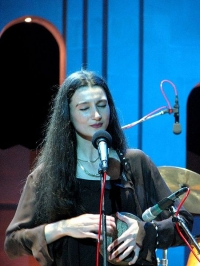
Aziza Mustafa Zadeh (Azeri: Əzizə Mustafazadə; born December 19, 1969) also known as The Princess of Jazz, or Die Prinzessin des Jazz or as Jazziza is an Azerbaijani singer, pianist and composer who plays a fusion of jazz and mugam (a traditional improvisational style of Azerbaijan) with classical and Avant-garde influences. Reviewers have said that her style also shows some influence from Keith Jarrett. She currently resides in Mainz, Germany with her mother, Eliza Mustafa Zadeh, who is also her manager. Her two favorite leisure activities, she says, are painting and sleeping. She is a vegetarian. Since 1991, Aziza sold around 15 million albums worldwide.
Giovanni Pierluigi da Palestrina

Giovanni Pierluigi da Palestrina (b. 3 February 1525 – 2 February 1526; d. 2 February 1594) was an Italian Renaissance composer and the most well-known 16th-century representative of the Roman School of musical composition. Palestrina became famous through his output of sacred music. He had an enormous influence on the development of Roman Catholic church music, and his work has often been seen as the culmination of Renaissance polyphony. It is only recently, with the discovery and publication of a great deal of hitherto unknown or forgotten music by various Renaissance composers, that we have had the means to properly assess Palestrina in historical context.
Marc-André Hamelin
Marc-André Hamelin, OC, CQ (born September 5, 1961), is a Canadian virtuoso pianist and composer. Hamelin is recognized worldwide for the originality and technical proficiency of his performances of the classic repertoire. He has received 11 Grammy Award nominations.
The Divine Comedy

The Divine Comedy are a pop band from Northern Ireland, formed in 1989 and fronted by Neil Hannon. Hannon has been the only constant member of the group, playing, in some instances, all of the non-orchestral instrumentation except drums. To date, twelve studio albums have been released under the Divine Comedy name.
Steve Pogson

He is a music teacher and composer with a particular interest in musical applications of IT. I teach piano, guitar, sax and clarinet.
Brahms

Johannes Brahms (May 7, 1833 â April 3, 1897) was a German composer of the Romantic period. He was born in Hamburg and in his later years he settled in Vienna, Austria.
Brahms maintained a Classical sense of form and order in his works â in contrast to the opulence of the music of many of his contemporaries. Thus many admirers (though not necessarily Brahms himself) saw him as the champion of traditional forms and "pure music," as opposed to the New German embrace of program music.
Brahms venerated Beethoven: in the composer's home, a marble bust of Beethoven looked down on the spot where he composed, and some passages in his works are reminiscent of Beethoven's style. The main theme of the finale of Brahms's First Symphony is reminiscent of the main theme of the finale of Beethoven's Ninth, and when this resemblance was pointed out to Brahms he replied that any ass â jeder Esel â could see that.
Ein deutsches Requiem was partially inspired by his mother's death in 1865, but also incorporates material from a Symphony he started in 1854, but abandoned following Schumann's suicide attempt. He once wrote that the Requiem "belonged to Schumann". The first movement of this abandoned Symphony was re-worked as the first movement of the First Piano Concerto.
Brahms also loved the Classical composers Mozart and Haydn. He collected first editions and autographs of their works, and edited performing editions. He also studied the music of pre-classical composers, including Giovanni Gabrieli, Johann Adolph Hasse, Heinrich Schütz and especially Johann Sebastian Bach. His friends included leading musicologists, and with Friedrich Chrysander he edited an edition of the works of François Couperin. He looked to older music for inspiration in the arts of strict counterpoint; the themes of some of his works are modelled on Baroque sources, such as Bach's The Art of Fugue in the fugal finale of Cello Sonata No. 1, or the same composer's Cantata No. 150 in the passacaglia theme of the Fourth Symphony's finale.
Brahms maintained a Classical sense of form and order in his works â in contrast to the opulence of the music of many of his contemporaries. Thus many admirers (though not necessarily Brahms himself) saw him as the champion of traditional forms and "pure music," as opposed to the New German embrace of program music.
Brahms venerated Beethoven: in the composer's home, a marble bust of Beethoven looked down on the spot where he composed, and some passages in his works are reminiscent of Beethoven's style. The main theme of the finale of Brahms's First Symphony is reminiscent of the main theme of the finale of Beethoven's Ninth, and when this resemblance was pointed out to Brahms he replied that any ass â jeder Esel â could see that.
Ein deutsches Requiem was partially inspired by his mother's death in 1865, but also incorporates material from a Symphony he started in 1854, but abandoned following Schumann's suicide attempt. He once wrote that the Requiem "belonged to Schumann". The first movement of this abandoned Symphony was re-worked as the first movement of the First Piano Concerto.
Brahms also loved the Classical composers Mozart and Haydn. He collected first editions and autographs of their works, and edited performing editions. He also studied the music of pre-classical composers, including Giovanni Gabrieli, Johann Adolph Hasse, Heinrich Schütz and especially Johann Sebastian Bach. His friends included leading musicologists, and with Friedrich Chrysander he edited an edition of the works of François Couperin. He looked to older music for inspiration in the arts of strict counterpoint; the themes of some of his works are modelled on Baroque sources, such as Bach's The Art of Fugue in the fugal finale of Cello Sonata No. 1, or the same composer's Cantata No. 150 in the passacaglia theme of the Fourth Symphony's finale.
Andy Williams

Howard Andrew "Andy" Williams (born December 3, 1927) is an American pop singer. Andy Williams has recorded 18 Gold and three Platinum certified albums. When Ronald Reagan was president, he declared Andy's voice to be "a national treasure". He had his own popular TV variety show from 1962–71. He also owns his own theater, the Moon River Theatre in Branson, Missouri.
Williams' solo career began in 1952 after his brothers left the act. He recorded six sides for RCA Victor's label "X," but none of them were popular hits.
After finally landing a spot as a regular on Steve Allen's Tonight Show in 1955, he was signed to a recording contract with Cadence Records, a small label in New York run by conductor Archie Bleyer. His third single, "Canadian Sunset" (1956) hit the Top Ten, and was soon followed by his only Billboard #1 hit, "Butterfly" (a cover of a Charlie Gracie record on which Williams imitated Elvis Presley). More hits followed, including "The Hawaiian Wedding Song" (U.S. #11), "Are You Sincere" (U.S. #3), "The Village of St. Bernadette" (U.S. #7), "Lonely Street" (U.S. #5), and "I Like Your Kind Of Love" (U.S. #8) before Williams moved to Columbia Records in 1961, having moved from New York to Los Angeles and gaining another hit with "Can't Get Used to Losing You" (U.S. #2). In terms of chart popularity, the Cadence era was Williams' peak although songs he introduced on Columbia became much bigger standards.
During the 1960s, Williams became one of the most popular vocalists in the country and was signed to what was at that time the biggest recording contract in history. He was primarily an album artist, and at one time he had earned more gold albums than any solo performer except Frank Sinatra, Johnny Mathis and Elvis Presley. By 1973 he had earned as many as 18 gold album awards. Among his hit albums from this period were Moon River, Days of Wine and Roses (number one for 16 weeks in mid-1963), The Andy Williams Christmas Album, Dear Heart, The Shadow of Your Smile, Love, Andy, Get Together with Andy Williams, and Love Story. These recordings, along with his natural affinity for the music of the 1960s and early 1970s, combined to make him one of the premier easy listening singers of that era. In the UK, Williams continued to reach high chart status until 1978. The albums Can't Help Falling In Love (1970), Andy Williams Show (1970) Home Lovin Man ( #1 1971), Solitaire (1973), The Way We Were (1974) and Reflections (1978) all reached the Top 10.
Building on his experience with Allen and some short-term variety shows in the 1950s, he became the star of his own weekly television variety show in 1962. This series, The Andy Williams Show, won three Emmy Awards for outstanding variety program. Among his series regulars were the Osmond Brothers. He gave up the variety show in 1971 while it was still popular and retrenched to three specials per year. His Christmas specials, which appeared regularly until 1974 and intermittently from 1982 into the 1990s, were among the most popular of the genre. Williams has recorded eight Christmas albums over the years and has been penned as Mr. Christmas.
Williams hosted the most Grammy telecasts, from the 13th Annual Grammy Awards in 1971 through the 19th Annual Grammy Awards in 1977, totaling seven consecutive shows. He returned to television to do a syndicated half-hour series in 1976–77.
Williams' solo career began in 1952 after his brothers left the act. He recorded six sides for RCA Victor's label "X," but none of them were popular hits.
After finally landing a spot as a regular on Steve Allen's Tonight Show in 1955, he was signed to a recording contract with Cadence Records, a small label in New York run by conductor Archie Bleyer. His third single, "Canadian Sunset" (1956) hit the Top Ten, and was soon followed by his only Billboard #1 hit, "Butterfly" (a cover of a Charlie Gracie record on which Williams imitated Elvis Presley). More hits followed, including "The Hawaiian Wedding Song" (U.S. #11), "Are You Sincere" (U.S. #3), "The Village of St. Bernadette" (U.S. #7), "Lonely Street" (U.S. #5), and "I Like Your Kind Of Love" (U.S. #8) before Williams moved to Columbia Records in 1961, having moved from New York to Los Angeles and gaining another hit with "Can't Get Used to Losing You" (U.S. #2). In terms of chart popularity, the Cadence era was Williams' peak although songs he introduced on Columbia became much bigger standards.
During the 1960s, Williams became one of the most popular vocalists in the country and was signed to what was at that time the biggest recording contract in history. He was primarily an album artist, and at one time he had earned more gold albums than any solo performer except Frank Sinatra, Johnny Mathis and Elvis Presley. By 1973 he had earned as many as 18 gold album awards. Among his hit albums from this period were Moon River, Days of Wine and Roses (number one for 16 weeks in mid-1963), The Andy Williams Christmas Album, Dear Heart, The Shadow of Your Smile, Love, Andy, Get Together with Andy Williams, and Love Story. These recordings, along with his natural affinity for the music of the 1960s and early 1970s, combined to make him one of the premier easy listening singers of that era. In the UK, Williams continued to reach high chart status until 1978. The albums Can't Help Falling In Love (1970), Andy Williams Show (1970) Home Lovin Man ( #1 1971), Solitaire (1973), The Way We Were (1974) and Reflections (1978) all reached the Top 10.
Building on his experience with Allen and some short-term variety shows in the 1950s, he became the star of his own weekly television variety show in 1962. This series, The Andy Williams Show, won three Emmy Awards for outstanding variety program. Among his series regulars were the Osmond Brothers. He gave up the variety show in 1971 while it was still popular and retrenched to three specials per year. His Christmas specials, which appeared regularly until 1974 and intermittently from 1982 into the 1990s, were among the most popular of the genre. Williams has recorded eight Christmas albums over the years and has been penned as Mr. Christmas.
Williams hosted the most Grammy telecasts, from the 13th Annual Grammy Awards in 1971 through the 19th Annual Grammy Awards in 1977, totaling seven consecutive shows. He returned to television to do a syndicated half-hour series in 1976–77.
Aerosmith

Aerosmith is an American hard rock band, sometimes referred to as "The Bad Boys from Boston" The band was formed in Boston, Massachusetts in 1970. Guitarist Joe Perry and bassist Tom Hamilton, originally in a band together called the Jam Band, met up with singer Steven Tyler, drummer Joey Kramer, and guitarist Ray Tabano, and formed Aerosmith. By 1971, Tabano was replaced by Brad Whitford, and the band began developing a following in Boston.
They were signed to Columbia Records in 1972 and released a string of multi-platinum albums, beginning with their 1973 eponymous debut album. In 1975, the band broke into the mainstream with the album Toys in the Attic, and their 1976 follow-up Rocks cemented their status as hard rock superstars. The band did not fare well between 1980 and 1984, releasing a lone album, Rock in a Hard Place, which only went gold, failing to match the successes of their previous efforts.
Although Perry and Whitford returned in 1984 and the band signed a new deal with Geffen Records, it wasn't until the band sobered up and released 1987's Permanent Vacation that they regained the level of popularity they had experienced in the 1970s. After 38 years of performing, the band continues to tour and record music.
They were signed to Columbia Records in 1972 and released a string of multi-platinum albums, beginning with their 1973 eponymous debut album. In 1975, the band broke into the mainstream with the album Toys in the Attic, and their 1976 follow-up Rocks cemented their status as hard rock superstars. The band did not fare well between 1980 and 1984, releasing a lone album, Rock in a Hard Place, which only went gold, failing to match the successes of their previous efforts.
Although Perry and Whitford returned in 1984 and the band signed a new deal with Geffen Records, it wasn't until the band sobered up and released 1987's Permanent Vacation that they regained the level of popularity they had experienced in the 1970s. After 38 years of performing, the band continues to tour and record music.
Billy Strayhorn
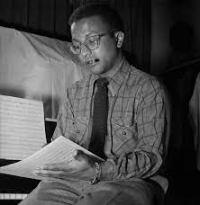
William Thomas Strayhorn (November 29, 1915 – May 31, 1967) was an American jazz composer, pianist, lyricist, and arranger, who collaborated with bandleader and composer Duke Ellington for nearly three decades. His compositions include "Take the 'A' Train", "Chelsea Bridge", "A Flower Is a Lovesome Thing", and "Lush Life".
Amilcare Ponchielli
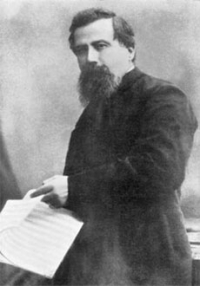
Amilcare Ponchielli (Italian: , 31 August 1834 – 16 January 1886) was an Italian opera composer, best known for his opera La Gioconda. He was married to the soprano Teresina Brambilla.
Jelly Roll Morton

Ferdinand "Jelly Roll" Morton (1880s – July 10, 1941) was an American ragtime and early jazz pianist, bandleader and composer.
Widely recognized as a pivotal figure in early jazz, Morton claimed, in self-promotional hyperbole, to have invented jazz outright in 1902. Morton was the first serious composer of jazz, naming and popularizing the "Spanish tinge" of exotic rhythms and penning such standards as "Wolverine Blues", "Black Bottom Stomp", and "Buddy Bolden's Blues".
Widely recognized as a pivotal figure in early jazz, Morton claimed, in self-promotional hyperbole, to have invented jazz outright in 1902. Morton was the first serious composer of jazz, naming and popularizing the "Spanish tinge" of exotic rhythms and penning such standards as "Wolverine Blues", "Black Bottom Stomp", and "Buddy Bolden's Blues".
Music theory

Music theory is the study of the practices and possibilities of music. The Oxford Companion to Music describes three interrelated uses of the term "music theory"
Nightwish

Nightwish is a Finnish rock quintet, formed in 1996 in the town of Kitee, Finland. Nightwish is considered one of the bands responsible for the development and rise in popularity of symphonic metal at the end of the 1990s, as well as the creation of the subgenre symphonic power metal.
Although they have been prominent in their home country since the release of their first single, “The Carpenter” (1997) and debut album Angels Fall First, they did not achieve worldwide fame until the release of the albums Oceanborn, Wishmaster and Century Child, which were released in 1998, 2000 and 2002 respectively. Their 2004 album, Once, which was sold over than 4 million copies, led to Nightwish video clips being shown on MTV in the United States and inclusion of their music in U.S. movie soundtracks. Their biggest U.S. hit single, “Wish I Had an Angel” (2004), made it onto three U.S. film soundtracks as a means to promote their North American tour. The band produced three more singles and two music videos for the album, as well as “Sleeping Sun”, from the 2005 “best of” compilation album, Highest Hopes, prior to vocalist Tarja Turunen’s dismissal.
In May 2007, former Alyson Avenue frontwoman, Swede Anette Olzon, was revealed as Turunen’s replacement, and in the autumn, the band released a new album Dark Passion Play, which was sold over 2 million copies. A tour supporting the album is currently in progress.
Although they have been prominent in their home country since the release of their first single, “The Carpenter” (1997) and debut album Angels Fall First, they did not achieve worldwide fame until the release of the albums Oceanborn, Wishmaster and Century Child, which were released in 1998, 2000 and 2002 respectively. Their 2004 album, Once, which was sold over than 4 million copies, led to Nightwish video clips being shown on MTV in the United States and inclusion of their music in U.S. movie soundtracks. Their biggest U.S. hit single, “Wish I Had an Angel” (2004), made it onto three U.S. film soundtracks as a means to promote their North American tour. The band produced three more singles and two music videos for the album, as well as “Sleeping Sun”, from the 2005 “best of” compilation album, Highest Hopes, prior to vocalist Tarja Turunen’s dismissal.
In May 2007, former Alyson Avenue frontwoman, Swede Anette Olzon, was revealed as Turunen’s replacement, and in the autumn, the band released a new album Dark Passion Play, which was sold over 2 million copies. A tour supporting the album is currently in progress.
Hans Zimmer

Hans Florian Zimmer (born September 12, 1957) is a German film score composer and music producer. He has composed music for over 100 films, including Hollywood blockbusters such as the Pirates of the Caribbean series, Gladiator, The Lion King, The Da Vinci Code and The Dark Knight.
Zimmer spent the early part of his career in the United Kingdom before moving to the United States. He is the head of the film music division at DreamWorks studios, and works with other composers through the company which he founded, Remote Control Productions. His work is notable for integrating electronic music sounds with traditional orchestral arrangements.
Zimmer spent the early part of his career in the United Kingdom before moving to the United States. He is the head of the film music division at DreamWorks studios, and works with other composers through the company which he founded, Remote Control Productions. His work is notable for integrating electronic music sounds with traditional orchestral arrangements.
Chopin

Frédéric Chopin (1 March 1810 – 17 October 1849) was a Polish composer and virtuoso pianist of the Romantic period. He is widely regarded as the greatest Polish composer, and ranks as one of music's greatest tone poets.
He was born in the village of Żelazowa Wola, in the Duchy of Warsaw, to a Polish mother and French-expatriate father, and in his early life was regarded as a child-prodigy pianist. In November 1830, at the age of 20, Chopin went abroad; following the suppression of the Polish November Uprising of 1830–31, he became one of many expatriates of the Polish "Great Emigration."
In Paris, he made a comfortable living as a composer and piano teacher, while giving few public performances. A Polish patriot,
Chopin's extant compositions were written primarily for the piano as a solo instrument. Though technically demanding, Chopin's style emphasizes nuance and expressive depth rather than virtuosity. Chopin invented musical forms such as the ballade and was responsible for major innovations in forms such as the piano sonata, waltz, nocturne, étude, impromptu and prelude. His works are mainstays of Romanticism in 19th-century classical music.
He was born in the village of Żelazowa Wola, in the Duchy of Warsaw, to a Polish mother and French-expatriate father, and in his early life was regarded as a child-prodigy pianist. In November 1830, at the age of 20, Chopin went abroad; following the suppression of the Polish November Uprising of 1830–31, he became one of many expatriates of the Polish "Great Emigration."
In Paris, he made a comfortable living as a composer and piano teacher, while giving few public performances. A Polish patriot,
Chopin's extant compositions were written primarily for the piano as a solo instrument. Though technically demanding, Chopin's style emphasizes nuance and expressive depth rather than virtuosity. Chopin invented musical forms such as the ballade and was responsible for major innovations in forms such as the piano sonata, waltz, nocturne, étude, impromptu and prelude. His works are mainstays of Romanticism in 19th-century classical music.
George Michael

Georgios Kyriacos Panayiotou (born June 25, 1963) best known as George Michael, is a two-time Grammy Award winning, English singer-songwriter, who has had a career as frontman of the duo Wham! as well as a soul-influenced, solo pop musician. He has sold over 100 million records worldwide, encompassing 12 British #1 singles, 7 British #1 albums, 10 US #1 singles, and 2 US #1 albums. His 1987 debut solo album, Faith became one of the best selling albums of all time, and also the first album to produce six top 5 singles in the United States and it has sold over 20 million copies worldwide. All four of his solo studio albums have all reached #1 on the U.K. charts and have gone on to become huge international successes. This success has made George Michael the most played artist on British radio over the past two decades.
Enya
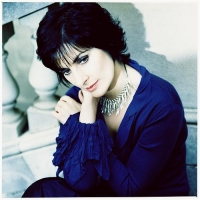
Enya (born Eithne Patricia Nà Bhraonáinon May 17, 1961, Gaoth Dobhair, County Donegal, Ireland), sometimes presented in the media as Enya Brennan, is an Irish singer, instrumentalist and composer. She is Ireland's best-selling solo artist and is officially the country's second biggest musical export (after U2). Her works have earned her four Grammy Awards and an Academy Award nomination, and she is also famous for performing in 10 different languages during her lengthy career. Enya is an approximate transcription of how Eithne is pronounced in her native Irish, in the Donegal dialect.
Mykola Leontovych

Mykola Dmytrovych Leontovych (Ukrainian: Микола Дмитрович Леонтович; sometimes spelt Leontovich; December 13 1877 – 23 January 1921) was a Ukrainian composer, choral conductor, and teacher of international renown. His music was inspired by Mykola Lysenko and the Ukrainian National Music School. Leontovych specialised in a cappella choral music, ranging from original compositions, to church music, to elaborate arrangements of folk music.
Alex North
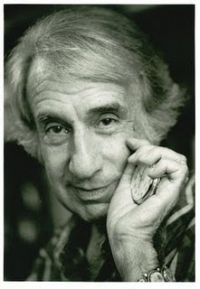
Alex North (December 4, 1910 – September 8, 1991) was an American composer who wrote the first jazz-based film score (A Streetcar Named Desire) and one of the first modernist scores written in Hollywood (Viva Zapata!).
Born Isadore Soifer in Chester, Pennsylvania, North was an original composer probably even by the classical music standards of the day. However, he managed to integrate his modernism into typical film music leitmotif structure, rich with themes. One of these became the famous song, "Unchained Melody". Nominated for 14 Oscars but unsuccessful each time, North and Ennio Morricone are the only film composers to receive the Lifetime Achievement Academy Award. North's frequent collaborator as orchestrator was the avant-garde composer Henry Brant. He won the 1968 Golden Globe award for his music to The Shoes of the Fisherman.
His best-known film scores include The Rainmaker (1956), Spartacus (1960), The Misfits (1961),The Children's Hour (1961) Cleopatra (1963), Who's Afraid of Virginia Woolf? (1966), and The Devil's Brigade (1968). His commissioned score for Stanley Kubrick's 2001: A Space Odyssey (1968) was discarded by the director, but has since been released on CD.
Though North is best known for his work in Hollywood, he spent years in New York writing music for the stage; he composed the score, by turns plaintive and jarring, for the original Broadway production of Death of a Salesman. It was in New York that he met Elia Kazan (director of Salesman), who brought him to Hollywood in the '50s. North was one of several composers who brought the influence of contemporary concert music into film, in part marked by an increased use of dissonance and complex rhythms. But there is also a lyrical quality to much of his work which may be connected to the influence of Aaron Copland, with whom he studied.
His classical works include a Rhapsody for Piano, Trumpet obbligato and Orchestra. He was nominated for a Grammy Award for his score for the 1976 television miniseries Rich Man, Poor Man. North is also known for his opening to the CBS television anthology series Playhouse 90.
Born Isadore Soifer in Chester, Pennsylvania, North was an original composer probably even by the classical music standards of the day. However, he managed to integrate his modernism into typical film music leitmotif structure, rich with themes. One of these became the famous song, "Unchained Melody". Nominated for 14 Oscars but unsuccessful each time, North and Ennio Morricone are the only film composers to receive the Lifetime Achievement Academy Award. North's frequent collaborator as orchestrator was the avant-garde composer Henry Brant. He won the 1968 Golden Globe award for his music to The Shoes of the Fisherman.
His best-known film scores include The Rainmaker (1956), Spartacus (1960), The Misfits (1961),The Children's Hour (1961) Cleopatra (1963), Who's Afraid of Virginia Woolf? (1966), and The Devil's Brigade (1968). His commissioned score for Stanley Kubrick's 2001: A Space Odyssey (1968) was discarded by the director, but has since been released on CD.
Though North is best known for his work in Hollywood, he spent years in New York writing music for the stage; he composed the score, by turns plaintive and jarring, for the original Broadway production of Death of a Salesman. It was in New York that he met Elia Kazan (director of Salesman), who brought him to Hollywood in the '50s. North was one of several composers who brought the influence of contemporary concert music into film, in part marked by an increased use of dissonance and complex rhythms. But there is also a lyrical quality to much of his work which may be connected to the influence of Aaron Copland, with whom he studied.
His classical works include a Rhapsody for Piano, Trumpet obbligato and Orchestra. He was nominated for a Grammy Award for his score for the 1976 television miniseries Rich Man, Poor Man. North is also known for his opening to the CBS television anthology series Playhouse 90.
Eric Satie

Éric Alfred Leslie Satie (Honfleur, 17 May 1866 – Paris, 1 July 1925) was a French composer and pianist. Starting with his first composition in 1884, he signed his name as Erik Satie.
Satie was introduced as a "gymnopedist" in 1887, shortly before writing his most famous compositions, the Gymnopédies. Later, he also referred to himself as a "phonometrician" (meaning "someone who measures sounds") preferring this designation to that of "musician", after having been called "a clumsy but subtle technician" in a book on contemporary French composers published in 1911.
In addition to his body of music, Satie also left a remarkable set of writings, having contributed work for a range of publications, from the dadaist 391 to the American Vanity Fair. Although in later life he prided himself on always publishing his work under his own name, in the late nineteenth century he appears to have used pseudonyms such as Virginie Lebeau and François de Paule in some of his published writings.
Satie was a colourful figure in the early 20th century Parisian avant-garde. He was a precursor to later artistic movements such as minimalism, repetitive music, and the Theatre of the Absurd.
Satie was introduced as a "gymnopedist" in 1887, shortly before writing his most famous compositions, the Gymnopédies. Later, he also referred to himself as a "phonometrician" (meaning "someone who measures sounds") preferring this designation to that of "musician", after having been called "a clumsy but subtle technician" in a book on contemporary French composers published in 1911.
In addition to his body of music, Satie also left a remarkable set of writings, having contributed work for a range of publications, from the dadaist 391 to the American Vanity Fair. Although in later life he prided himself on always publishing his work under his own name, in the late nineteenth century he appears to have used pseudonyms such as Virginie Lebeau and François de Paule in some of his published writings.
Satie was a colourful figure in the early 20th century Parisian avant-garde. He was a precursor to later artistic movements such as minimalism, repetitive music, and the Theatre of the Absurd.
Danny Elfman

Daniel Robert "Danny" Elfman (born May 29, 1953) is an American musician, best known for composing music for television and movies, and leading the rock band Oingo Boingo as singer/songwriter from 1976 until its breakup in 1995. He is a frequent collaborator with long-time friend Tim Burton, and has scored all but two of his films. He was nominated for four Academy Awards and won a Grammy Award for Tim Burton's Batman and an Emmy Award for his Desperate Housewives theme. Elfman also wrote the theme for the video game Fable. He is also famous for creating The Simpsons main title theme, and his role as Jack Skellington's singing voice in The Nightmare Before Christmas. He is the Uncle in-law to actress Jenna Elfman.
Clare Fischer
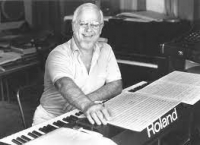
Douglas Clare Fischer (October 22, 1928 – January 26, 2012) was an American keyboardist, composer, arranger, and bandleader. After graduating from Michigan State University (from which, five decades later, he would receive an honorary doctorate), he became the pianist and arranger for the vocal group the Hi-Lo's in the late 1950s. Fischer went on to work with Donald Byrd and Dizzy Gillespie, and became known for his Latin and bossa nova recordings in the 1960s. He composed the Latin jazz standard "Morning", and the jazz standard "Pensativa". Consistently cited by jazz pianist and composer Herbie Hancock as a major influence ("I wouldn't be me without
Jeanine Tesori

Jeanine Tesori is an American composer and musical arranger. She is the most prolific and honored female theatrical composer in history, with five Broadway musicals and five Tony Award nominations.
Spring Awakening

Spring Awakening is a Tony Award-winning rock musical with music by Duncan Sheik and book and lyrics by Steven Sater. The musical is based on the controversial 1891 German play of the same title by Frank Wedekind. Set in late-nineteenth century Germany, it concerns teenagers who are discovering the inner and outer tumult of sexuality. The original play was banned in Germany due to its portrayal of masturbation, abortion, rape and suicide. In the musical, alt-rock is employed as part of the folk-infused rock score. During the musical, characters sometimes break the fourth wall to express their motivations and desires directly to the audience.
After a number of workshops, concerts and rewrites over a seven-year period, Spring Awakening premiered Off-Broadway at the Atlantic Theatre Company on May 19, 2006 and ran through August 17, 2006. The show then opened on Broadway at the Eugene O'Neill Theatre on December 10, 2006 and received favorable reviews. Spring Awakening received eleven 2007 Tony Award nominations, winning eight, including Tonys for best musical, direction, book, score and featured actor. The show also won four Drama Desk Awards, including Outstanding Musical. The production is directed by Michael Mayer and choreographed by Bill T. Jones.
After a number of workshops, concerts and rewrites over a seven-year period, Spring Awakening premiered Off-Broadway at the Atlantic Theatre Company on May 19, 2006 and ran through August 17, 2006. The show then opened on Broadway at the Eugene O'Neill Theatre on December 10, 2006 and received favorable reviews. Spring Awakening received eleven 2007 Tony Award nominations, winning eight, including Tonys for best musical, direction, book, score and featured actor. The show also won four Drama Desk Awards, including Outstanding Musical. The production is directed by Michael Mayer and choreographed by Bill T. Jones.
A. Malando
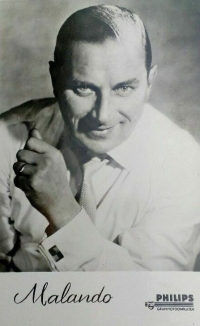
Malando Composer Born: May 26, 1908, Rotterdam, Netherlands Died: November 22, 1980, Bussum, Netherlands
Songs Ole guapa Guapita
Songs Ole guapa Guapita
Burgmuller
Johann Friedrich Franz Burgmüller, generally known as Friedrich Burgmüller (born Regensburg, Germany 4 December 1806 – died 13 February 1874) was a German pianist and composer.
Stevie Wonder

Stevie Wonder (born Stevland Hardaway Judkins on May 13, 1950, name later changed to Stevland Hardaway Morris) is an American singer-songwriter, multi-instrumentalist, and record producer. A prominent figure in popular music during the latter half of the 20th century , Wonder has recorded more than thirty top ten hits, won 26 Grammy Awards (a record for a solo artist), plus one for lifetime achievement, won an Academy Award for Best Song and been inducted into both the Rock and Roll and Songwriters halls of fame. He has also been awarded the Polar Music Prize.
Blind from infancy, Wonder signed with Motown Records as a pre-adolescent at age twelve, and continues to perform and record for the label to this day. He has nine U.S. number-one hits to his name (on the pop Charts, 20 U.S. R&B number one hits), and album sales totaling more than 150 million units. Wonder has recorded several critically acclaimed albums and hit singles, and writes and produces songs for many of his label mates and outside artists as well. Wonder plays the piano, synthesizer, harmonica, congas, drums, bongos, organ, melodica, and clavinet. In his early career, he was best known for his harmonica work, but today he is better known for his keyboard skills and vocals.
Blind from infancy, Wonder signed with Motown Records as a pre-adolescent at age twelve, and continues to perform and record for the label to this day. He has nine U.S. number-one hits to his name (on the pop Charts, 20 U.S. R&B number one hits), and album sales totaling more than 150 million units. Wonder has recorded several critically acclaimed albums and hit singles, and writes and produces songs for many of his label mates and outside artists as well. Wonder plays the piano, synthesizer, harmonica, congas, drums, bongos, organ, melodica, and clavinet. In his early career, he was best known for his harmonica work, but today he is better known for his keyboard skills and vocals.
Richard Strauss

Richard Georg Strauss (German pronunciation: ; 11 June 1864 – 8 September 1949) was a German composer, conductor, pianist, and violinist. Considered a leading composer of the late Romantic and early modern eras, he has been described as a successor of Richard Wagner and Franz Liszt. Along with Gustav Mahler, he represents the late flowering of German Romanticism after Wagner, in which pioneering subtleties of orchestration are combined with an advanced harmonic style.
Ernesto Lecuona
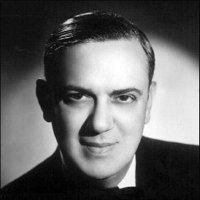
Ernesto Lecuona y Casado (Spanish pronunciation: ; August 6, 1895 – November 29, 1963) was a Cuban composer and pianist of worldwide fame. He composed over six hundred pieces, mostly in the Cuban vein, and was a pianist of exceptional skill. His father was Canarian and his mother was Cuban.
Carl Orff

Carl Orff (July 10, 1895 – March 29, 1982) was a 20th-century German composer, best known for his cantata Carmina Burana (1937). In addition to his career as a composer, Orff developed an influential method of music education for children.
Orff is most known for Carmina Burana (1937), a "scenic cantata". It is the first of a trilogy that also includes Catulli Carmina and Trionfo di Afrodite. Carmina Burana reflected his interest in medieval German poetry. Together the trilogy is called Trionfi, or "Triumphs". The composer described it as the celebration of the triumph of the human spirit through sexual and holistic balance. The work was based on thirteenth-century poetry found in a manuscript dubbed the Codex latinus monacensis found in the Benedictine monastery of Benediktbeuern in 1803 and written by the Goliards; this collection is also known as Carmina Burana. While "modern" in some of his compositional techniques, Orff was able to capture the spirit of the medieval period in this trilogy, with infectious rhythms and easy tonalities. The medieval poems, written in Latin and an early form of German, are often racy, but without descending into smut. "Fortuna Imperatrix Mundi", commonly known as "O Fortuna", from Carmina Burana is often used to denote primal forces, for example in the Oliver Stone movie The Doors.. The work's association with fascism also led Pier Paolo Pasolini to use the movement "Veris Leta Facies" to accompany the concluding scenes of torture and murder in his final film Salò, or the 120 Days of Sodom.
With the success of Carmina Burana, Orff disowned all of his previous works except for Catulli Carmina and the Entrata (an orchestration of "The Bells" by William Byrd (1539–1623)), which were rewritten until acceptable by Orff. As an historical aside, Carmina Burana is probably the most famous piece of music composed and premiered in Nazi Germany. Carmina Burana was in fact so popular that Orff received a commission in Frankfurt to compose incidental music for A Midsummer Night's Dream, which was supposed to replace the banned music by Mendelssohn. After the war, he claimed not to be satisfied with the music and reworked it into the final version that was first performed in 1964.
Orff is most known for Carmina Burana (1937), a "scenic cantata". It is the first of a trilogy that also includes Catulli Carmina and Trionfo di Afrodite. Carmina Burana reflected his interest in medieval German poetry. Together the trilogy is called Trionfi, or "Triumphs". The composer described it as the celebration of the triumph of the human spirit through sexual and holistic balance. The work was based on thirteenth-century poetry found in a manuscript dubbed the Codex latinus monacensis found in the Benedictine monastery of Benediktbeuern in 1803 and written by the Goliards; this collection is also known as Carmina Burana. While "modern" in some of his compositional techniques, Orff was able to capture the spirit of the medieval period in this trilogy, with infectious rhythms and easy tonalities. The medieval poems, written in Latin and an early form of German, are often racy, but without descending into smut. "Fortuna Imperatrix Mundi", commonly known as "O Fortuna", from Carmina Burana is often used to denote primal forces, for example in the Oliver Stone movie The Doors.. The work's association with fascism also led Pier Paolo Pasolini to use the movement "Veris Leta Facies" to accompany the concluding scenes of torture and murder in his final film Salò, or the 120 Days of Sodom.
With the success of Carmina Burana, Orff disowned all of his previous works except for Catulli Carmina and the Entrata (an orchestration of "The Bells" by William Byrd (1539–1623)), which were rewritten until acceptable by Orff. As an historical aside, Carmina Burana is probably the most famous piece of music composed and premiered in Nazi Germany. Carmina Burana was in fact so popular that Orff received a commission in Frankfurt to compose incidental music for A Midsummer Night's Dream, which was supposed to replace the banned music by Mendelssohn. After the war, he claimed not to be satisfied with the music and reworked it into the final version that was first performed in 1964.
Carla Bley

Carla Bley (born Lovella May Borg, May 11, 1936) is an American jazz composer, pianist, organist and bandleader. An important figure in the free jazz movement of the 1960s, she is perhaps best known for her jazz opera Escalator over the Hill (released as a triple LP set), as well as a book of compositions that have been performed by many other artists, including Gary Burton, Jimmy Giuffre, George Russell, Art Farmer, John Scofield and her ex-husband Paul Bley.
Alice in Wonderland

Alice in Wonderland is a musical by Henry Savile Clarke, Walter Slaughter and Aubrey Hopwood, based on Lewis Carroll's books Alice's Adventures in Wonderland and Through the Looking-Glass. It debuted at the Prince of Wales Theatre in the West End in 1886.
Jun Maeda

Jun Maeda (麻枝 准 Maeda Jun?, born January 3, 1975) is a Japanese writer working for the software company Key; he has majorly contributed as a scenario writer, lyricist, and musical composer for the visual novels the company produces. His birth name in kanji was written as Maeda Jun (前田 純?), though there is no change in pronunciation. Originally from Mie, Japan, he graduated from Mie high school and later went on to graduate from Chukyo University with a major in psychology. Before forming Key, Maeda worked for the company Tactics where he had a hand in the creation of two games for that company, Moon. and One: Kagayaku Kisetsu e. After forming Key, Maeda has put much work into such titles as Kanon, Air, Clannad, Little Busters! and Angel Beats!. He is also the author of a manga series entitled Hibiki's Magic.
Eminem

Marshall Bruce Mathers III (born October 17, 1972), known as Slim Shady and his primary stage name Eminem, is an Academy Award-winning American rapper, record producer and actor. Having sold over seventy million albums worldwide, Eminem is one of the highest-selling rappers of all time.
Eminem quickly gained popularity in 1999 with his major-label debut album The Slim Shady LP. The following album, The Marshall Mathers LP, became the fastest-selling hip hop album in history, followed by an increasing amount of popularity, critical praise, as well as controversy. While Eminem has won many Grammy Awards, been praised for having "verbal energy", high quality of lyricism and been ranked at number nine on MTV's list of The Greatest MCs of All Time, he has often been infamous for the controversy surrounding many of these lyrics, including allegations of glorifying homophobia, misogyny, and violence.
Eminem quickly gained popularity in 1999 with his major-label debut album The Slim Shady LP. The following album, The Marshall Mathers LP, became the fastest-selling hip hop album in history, followed by an increasing amount of popularity, critical praise, as well as controversy. While Eminem has won many Grammy Awards, been praised for having "verbal energy", high quality of lyricism and been ranked at number nine on MTV's list of The Greatest MCs of All Time, he has often been infamous for the controversy surrounding many of these lyrics, including allegations of glorifying homophobia, misogyny, and violence.
Mozart

Wolfgang Amadeus Mozart, full name Johann Chrysostom Wolfgang Amadeus Mozart (27 January 1756 â 5 December 1791) was a prolific and influential composer of the Classical era. His over 600 compositions include works widely acknowledged as pinnacles of symphonic, concertante, chamber, piano, operatic, and choral music. Mozart is among the most enduringly popular of classical composers, and many of his works are part of the standard concert repertoire.
Mozart's music, like Haydn's, stands as an archetypal example of the Classical style. His works spanned the period during which that style transformed from one exemplified by the style galant to one that began to incorporate some of the contrapuntal complexities of the late Baroque, complexities against which the galant style had been a reaction. Mozart's own stylistic development closely paralleled the development of the classical style as a whole. In addition, he was a versatile composer and wrote in almost every major genre, including symphony, opera, the solo concerto, chamber music including string quartet and string quintet, and the piano sonata. While none of these genres were new, the piano concerto was almost single-handedly developed and popularized by Mozart. He also wrote a great deal of religious music, including masses; and he composed many dances, divertimenti, serenades, and other forms of light entertainment.
The central traits of the classical style can be identified in Mozart's music. Clarity, balance, and transparency are hallmarks of his work.
Mozart's music, like Haydn's, stands as an archetypal example of the Classical style. His works spanned the period during which that style transformed from one exemplified by the style galant to one that began to incorporate some of the contrapuntal complexities of the late Baroque, complexities against which the galant style had been a reaction. Mozart's own stylistic development closely paralleled the development of the classical style as a whole. In addition, he was a versatile composer and wrote in almost every major genre, including symphony, opera, the solo concerto, chamber music including string quartet and string quintet, and the piano sonata. While none of these genres were new, the piano concerto was almost single-handedly developed and popularized by Mozart. He also wrote a great deal of religious music, including masses; and he composed many dances, divertimenti, serenades, and other forms of light entertainment.
The central traits of the classical style can be identified in Mozart's music. Clarity, balance, and transparency are hallmarks of his work.
Chicago
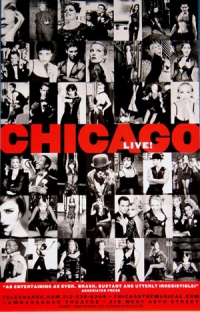
Chicago is a Kander and Ebb musical set in prohibition era Chicago. The book is by Ebb and Bob Fosse. The story is a satire on corruption in the administration of criminal justice, and the concept of the "celebrity criminal." The musical is based on a 1926 play of the same name by reporter Maurine Dallas Watkins about actual criminals and crimes she had reported on.
The original 1975 Broadway production ran for a total of 936 performances. Bob Fosse choreographed the original production, and his style is strongly identified with the show. Chicago's 1996 Broadway revival holds the record for the longest-running musical revival on Broadway (not counting the revue Oh! Calcutta!) and, as of March 2, 2008, it has played for more than 4,684 performances. The revival was followed by a production on London's West End and several tours and international productions. An Academy Award-winning film version of the musical was released in 2002.
The original 1975 Broadway production ran for a total of 936 performances. Bob Fosse choreographed the original production, and his style is strongly identified with the show. Chicago's 1996 Broadway revival holds the record for the longest-running musical revival on Broadway (not counting the revue Oh! Calcutta!) and, as of March 2, 2008, it has played for more than 4,684 performances. The revival was followed by a production on London's West End and several tours and international productions. An Academy Award-winning film version of the musical was released in 2002.
 Sheet Music Max is a site for those who wants to access popular sheet music easily,
letting them download the sheet music for free for trial purposes.
It's completely free to download and try the listed sheet music, but you have to delete the files after 24 hours of trial.
Don't forget, if you like the piece of music you have just learned playing,
treat the artist with respect, and go buy the original sheet music.
Sheet Music Max is a site for those who wants to access popular sheet music easily,
letting them download the sheet music for free for trial purposes.
It's completely free to download and try the listed sheet music, but you have to delete the files after 24 hours of trial.
Don't forget, if you like the piece of music you have just learned playing,
treat the artist with respect, and go buy the original sheet music.
